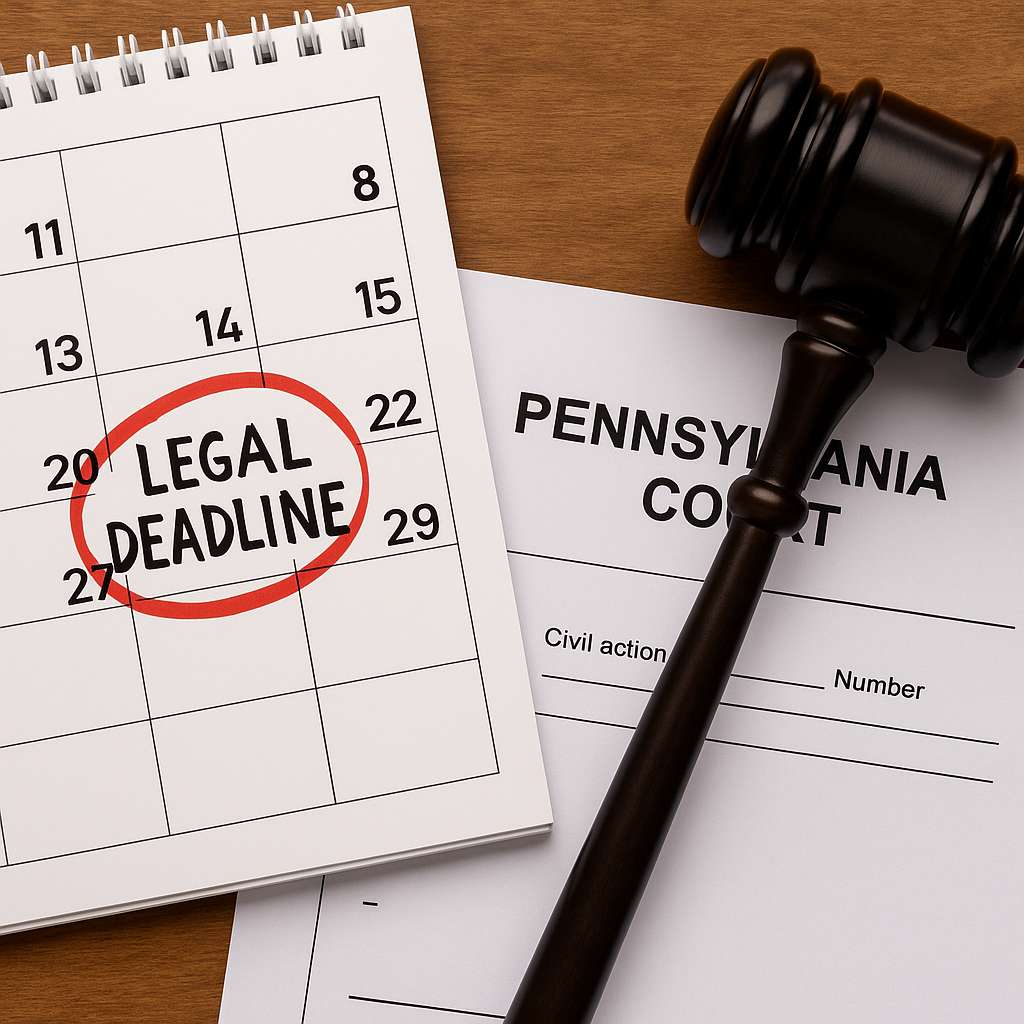Understanding Pennsylvania’s Personal Injury Lawsuit Deadline
If you’ve been injured in a car accident, slip and fall, medical malpractice, or any other incident caused by negligence, you may be entitled to compensation. But there’s a strict deadline for filing a claim in Pennsylvania, known as the statute of limitations.
Failing to file within this timeframe can mean losing your right to seek compensation, no matter how strong your case is. In this guide, we’ll cover how long you have to file a personal injury lawsuit in Pennsylvania, exceptions to the rule, and why acting quickly is in your best interest.
Pennsylvania’s 2-Year Rule for Filing a Personal Injury Lawsuit
What Is the Statute of Limitations?
The statute of limitations is the legal deadline by which you must file a lawsuit. In Pennsylvania, the deadline for most personal injury cases is:
🕒 2 years from the date of the injury – Under 42 Pa. C.S. § 5524, individuals have two years to file a personal injury lawsuit in civil court.
This applies to:
✔ Car Accidents
✔ Slip and Fall Injuries
✔ Medical Malpractice
✔ Product Liability (Defective Products)
✔ Wrongful Death
If you miss the two-year deadline, the court will likely dismiss your case, and you will lose the right to compensation.
⏩ Pro Tip: Even if the insurance claim process is ongoing, the lawsuit deadline does not change—you must file before the two-year window expires.
Exceptions to Pennsylvania’s 2-Year Rule
While the 2-year statute of limitations applies to most personal injury claims, there are exceptions that can extend or shorten the deadline.
1. Minors (Injured Children) Get More Time to File
🕒 Deadline: The 2-year clock does not start ticking until the minor turns 18.
✔ If a child is injured in an accident at age 10, they have until age 20 to file a lawsuit.
2. Claims Against Government Entities (Stricter Deadlines)
🕒 Deadline: If the State of Pennsylvania, a city, or a government agency is involved in your injury (e.g., a public transportation accident), you must:
✔ File a notice of intent to sue within 6 months.
✔ After that, the 2-year rule applies.
⏩ Pro Tip: Suing a government agency has different legal hurdles—contacting a lawyer early is crucial.
3. Discovery Rule (Injuries That Aren’t Immediately Known)
🕒 Deadline: The 2-year period starts when you discover the injury, not necessarily the accident date.
✔ Example: If medical malpractice caused an internal injury, but you didn’t find out until a doctor diagnosed it later, the clock starts from the discovery date.
Why Filing Early Strengthens Your Case
Even though you have two years, waiting too long can hurt your case in multiple ways:
✅ Stronger Evidence: Witness statements, accident reports, and surveillance footage can disappear over time. Filing early ensures evidence is preserved.
✅ Better Negotiation Leverage: Insurance companies know the deadline and may delay negotiations hoping you’ll miss it. Filing early prevents this tactic.
✅ Faster Compensation: The sooner you file, the sooner you can receive a settlement or court award.
✅ Avoid Last-Minute Filing Issues: Legal procedures take time. If you wait until the deadline, your case may lack proper preparation.
⏩ Pro Tip: A personal injury lawyer can handle deadlines, paperwork, and negotiations while you focus on recovery.
Don’t Wait – Protect Your Rights Today
If you or a loved one has been injured in Pennsylvania, time is of the essence. The statute of limitations can make or break your case—waiting too long could mean losing your right to compensation.
“If you need legal representation, visit The Oakes Firm for a free consultation.”
Common Mistakes That Can Cost You Your Injury Claim
⚠️ Avoiding Legal Mistakes When Time Is Running Out
Even if you know the statute of limitations in Pennsylvania, simple mistakes or delays can put your entire case at risk. Below are common pitfalls that prevent people from receiving the compensation they deserve:
❌ 1. Assuming Insurance Negotiations “Pause” the Deadline
Many injury victims believe that as long as they are in contact with the insurance company, they don’t need to worry about filing a lawsuit. This is false. Negotiating with insurance adjusters does not stop the legal clock. If you wait until negotiations break down — and the statute has already expired — you’ve lost your right to sue.
❌ 2. Filing Against the Wrong Party
In some cases, injury claims involve multiple potential defendants, like property owners, business operators, or manufacturers. Suing the wrong party — or failing to include all liable parties — may result in dismissal if not corrected before the statute expires. That’s why early legal consultation is so important.
❌ 3. Missing the 6-Month Notice Deadline for Government Claims
Any claim involving SEPTA, a city vehicle, a school, or a public agency must begin with a notice of intent to sue within 6 months. Many victims miss this step and find out too late that their claim is barred. This is one of the most unforgiving deadlines in Pennsylvania injury law.
✅ When in Doubt, Call a Lawyer
Statutes of limitation are strictly enforced. Even a one-day delay can prevent your claim from ever being heard in court. To avoid costly errors and preserve your right to compensation, it’s critical to speak with a Pennsylvania personal injury lawyer as early as possible.
Whether your case involves a car crash, medical negligence, or unsafe property conditions, a qualified attorney will evaluate the facts, gather evidence quickly, and file your claim within all applicable deadlines.
Philly Legal Connect is a legal information platform designed to provide news, analysis, and general insights into legal matters. We are not a law firm and do not provide legal representation or legal advice. Any information provided on this website is for educational and informational purposes only and should not be interpreted as legal advice. If you require legal assistance, we strongly recommend consulting a licensed attorney in your jurisdiction. Use of this website does not create an attorney-client relationship.




